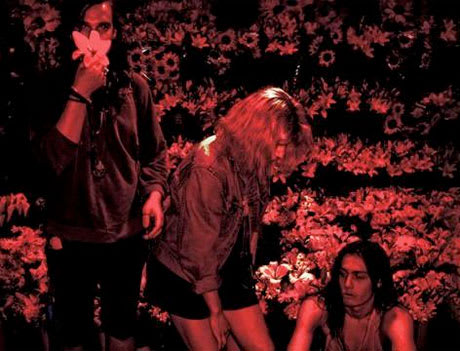Salem seem to have learned a thing or two about the importance of practice. It's been almost a year since their infamous Fader Fort SXSW appearance, where they were booed offstage and faced a spectacular verbal assault from both the independent press and the Twitterverse. Still, they were courageous -- we all know no press is bad press -- and despite their negative reputation, they remained a buzz band, putting out a well-received LP, 2010's King Night, and embarking on their first North American tour.
After pumping the air with a thick haze of smoke, Salem's Montreal set began with their distorted bell-ringing intro music, known by fans from the band's We Make It Good mixtape. The trio were silhouettes in the fog, evoking the daunting feeling characterized so well in their videos and transporting the crowd to the deep woods of rural America to participate in some sort of ritualistic performance.
The band writhed slowly behind their respective instruments. Heather Marlatt looked tired behind her keyboard, and when she took to the microphone to sing on tracks like "Asia" and "Frost," no semblance of enthusiasm fell across her face. Similarly, synth-player John Holland kept his face down, rocking his head, his teardrop tattoo hidden beneath the angle of his eye. Rapper/drum machinist Jack Donoghue feigned an ounce more enthusiasm than his bandmates, getting stoked about his rhyming skills on the group's disturbed track "Sick," while throwing his hair in front of his face and boisterously interacting with the audience. For all those who are wondering, his rapping skills have greatly improved.
This new goth/witch house/hip-hop genre relies so heavily on appropriation that the show was full of meta moments. One occurred when Salem played Ratface Dreamangel's chopped 'n' screwed version of Alice Deejay's eminent '90s house track "Better Off Alone." It's a handful to work out in your mind, but if a song is an appropriation in the first place, then Salem was performing a cover, right?
Maybe they were in a trance. Maybe it was part of their "persona" as drug-addicted kids from Michigan slums. Whatever that magic was, it was hypnotic, giving off the impression of a carefully orchestrated live performance. The show was a spectacle and a surprising victory for Salem. Whether you love 'em or hate 'em, it's certain that like so many Internet-inspired musicians -- from Lil B to James Blake -- Salem are here to stay. And with that, Detroit remains the capital of darkness.
After pumping the air with a thick haze of smoke, Salem's Montreal set began with their distorted bell-ringing intro music, known by fans from the band's We Make It Good mixtape. The trio were silhouettes in the fog, evoking the daunting feeling characterized so well in their videos and transporting the crowd to the deep woods of rural America to participate in some sort of ritualistic performance.
The band writhed slowly behind their respective instruments. Heather Marlatt looked tired behind her keyboard, and when she took to the microphone to sing on tracks like "Asia" and "Frost," no semblance of enthusiasm fell across her face. Similarly, synth-player John Holland kept his face down, rocking his head, his teardrop tattoo hidden beneath the angle of his eye. Rapper/drum machinist Jack Donoghue feigned an ounce more enthusiasm than his bandmates, getting stoked about his rhyming skills on the group's disturbed track "Sick," while throwing his hair in front of his face and boisterously interacting with the audience. For all those who are wondering, his rapping skills have greatly improved.
This new goth/witch house/hip-hop genre relies so heavily on appropriation that the show was full of meta moments. One occurred when Salem played Ratface Dreamangel's chopped 'n' screwed version of Alice Deejay's eminent '90s house track "Better Off Alone." It's a handful to work out in your mind, but if a song is an appropriation in the first place, then Salem was performing a cover, right?
Maybe they were in a trance. Maybe it was part of their "persona" as drug-addicted kids from Michigan slums. Whatever that magic was, it was hypnotic, giving off the impression of a carefully orchestrated live performance. The show was a spectacle and a surprising victory for Salem. Whether you love 'em or hate 'em, it's certain that like so many Internet-inspired musicians -- from Lil B to James Blake -- Salem are here to stay. And with that, Detroit remains the capital of darkness.
